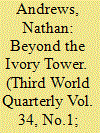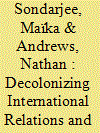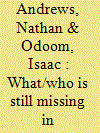|
|
|
Sort Order |
|
|
|
Items / Page
|
|
|
|
|
|
|
| Srl | Item |
| 1 |
ID:
116897


|
|
|
|
|
| Publication |
2013.
|
| Summary/Abstract |
International Relations ( ir ) scholars and students are often presented with four (sometimes five) 'great debates' that characterise the 'state of the discipline'. However, Robert Cox's 1981 article in Millennium simplified the discussion into two binaries: problem-solving theory vs critical theory. While this configuration has been influential, it has inhibited the reflexivity, complexity, as well as the multidisciplinary nature of the discipline. This paper moves beyond this problematic simplification to construct a 'third way', which borrows from both rationalist and critical approaches to craft a somewhat distinct niche in ir theory. It calls for the dual goal of deconstruction and reconstruction. With this approach I seek to show the mutually constitutive synergies between knowledge/theory and practice, and to expatiate on the argument that theory is indeed always for someone and for some purpose, whether such normative underpinnings are latent or manifest.
|
|
|
|
|
|
|
|
|
|
|
|
|
|
|
|
| 2 |
ID:
192923


|
|
|
|
|
| Summary/Abstract |
Over the past decade, there has been a new “decolonial turn,” albeit less related than before to land and political independence. “To decolonize” is now associated with something less tangible and often under-defined. We argue that scholars, especially Western ones, should avoid depoliticizing the expression “decolonizing” by using it as a buzzword. Scholars and policymakers should use the expression only if it is closely related to the political meaning ascribed to it by Global South and Indigenous activists and scholars. Decoloniality is a political project of human emancipation through collective struggles, entailing at least the following: 1) abolishing racial hierarchies within the hetero-patriarchal and capitalist world order, 2) dismantling the geopolitics of knowledge production, and 3) rehumanizing our relationships with Others and nature. We conclude that there is a need for epistemic humility and that Western scholars and institutions must refrain from using the word too freely.
|
|
|
|
|
|
|
|
|
|
|
|
|
|
|
|
| 3 |
ID:
135039


|
|
|
|
|
| Summary/Abstract |
Because of the absence of evidence to show for its utility, the notion of ‘development’ has been fraught with many debates over the years. This paper is concerned with re-examining the future of development studies, based on its past and present trajectories. The argument here is that development may be useful if its norms and practices become context-specific and are made to benefit its purported beneficiaries. The chronology spans the period after World War II to the present day, and thus covers theories that envision alternatives. While this chronology is overlapping, we hope to show that development studies has been marked by both continuities and discontinuities.
|
|
|
|
|
|
|
|
|
|
|
|
|
|
|
|
| 4 |
ID:
172876


|
|
|
|
|
| Summary/Abstract |
In this article, we analyse the factors underpinning the shift towards hybrid security governance in Africa. Extant scholarship largely attributes this shift to broader global processes, such as histories of colonialism, neoliberalism and transformations in global governance, which have served to legitimize the role of private authority in security provision around sites of resource extraction. Our analysis seeks to understand the relative and relational influence of power and rules in international politics by offering empirical insights about what hybrid security arrangements look like ‘on the ground’. Drawing upon recently conducted fieldwork in Kenya, Uganda and Ghana, we examine how hybrid security arrangements affect the lives of those living near sites of natural resource extraction. Our analyses suggest that although hybrid security has emerged as the leading approach to security governance, this approach to security does not uniformly involve or serve the interests of all stakeholders. Rather, we find that hybrid security arrangements aid the security of extractive operations—securing investments in both physical and human capital—while sometimes undermining the security of nearby communities.
|
|
|
|
|
|
|
|
|
|
|
|
|
|
|
|
| 5 |
ID:
151484


|
|
|
|
|
| Summary/Abstract |
This paper engages with non-Western, specifically African, scholarship and insight with the goal of highlighting the importance of African contributions to IR theorising. We highlight the Western dominance in IR theorising and examine the inadequacy of the major analytical constructs provided by established IR theory in capturing and explaining shifting reality in Africa. We argue that African insights, experience and ideas present a challenge to dominant IR constructs and knowledge within the international system, and that these insights, when taken seriously, would enrich our understanding of IR. We show this by problematising some central (often taken-for-granted) IR concepts such as the state, liberalism and individualism and underscore the need to reconstruct more encompassing ‘stories’ and images to innovate, revise and potentially replace some of the conventional ‘stories’ that have been told in IR.
|
|
|
|
|
|
|
|
|
|
|
|
|
|
|
|
|
|
|
|
|